Pressing Olives
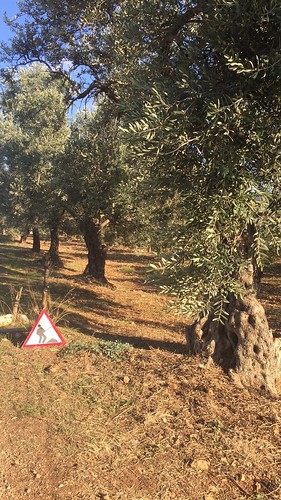
Watch out for people with sticks harvesting olives! A creative traffic sign my brother scattered around the village.
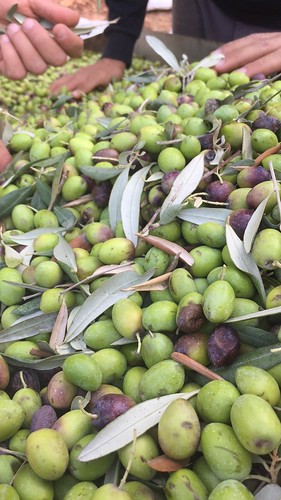
My brothers' hands, sorting olives from leaves and branches.
We managed to pick all our olives in only 4 days, resulting in 6 sacks full of fruit, which were pressed into no less than six 18L jugs of olive oil (each weighing 16kg). We completed the harvest on Sunday, October 22nd, and wanted to take them to the olive press that night. It was my turn to do it, but with all the heavy lifting and it being my first time in the olive pressing plant, my brothers encouraged me to wait till tomorrow when one of them could go with me. The next day the olive pressing plant we usually go to was booked up. My brother called all the other plants in the area, and non of them was available to take us. I called the one that we usually work with and made an appointment for Tuesday morning. I was going to go there by myself, even though nobody was available to help me, because it's not good to have the olives off the trees for more than 48hrs before pressing them. They will begin to spoil and the oil may become rancid.
The next morning we learned that overnight, the machinery at the olive pressing plant broke, and they are very behind on their appointment schedule. I decided to go there anyway, at the time they told me to be there. Because showing up is half of the world, right?
When I arrived they basically ignored me, because they were absorbed in testing the machinery that was just fixed. So there went my plant to get help carrying the 5 bags of olives we had picked. They were not completely full, but they were heavy. I weighted them all and they totalled 133kg. After all this unloading and weighing I finally managed to get a word with the owner's son, who told me to basically come back in four hours, because that's how far behind they are on their schedule. I felt a bit discouraged, and decided to call two other pressing plants nearby that passed my brother's high standards (we are all perfectionists in our family, as it turned out). The one in the Julis (another Druze village next to Yirka, where I currently was). They did not give me any indication of how long I will be waiting, so I decided to stick with my plan of staying at the place where I already was, and making my presence an advantage. I was counting first and foremost on the fact that everybody went home, combined with having only a relatively small amount of olives, and also a little doze of old fashioned Middle Eastern customs.
Let me explain the latter: Setting off to the olive press alone was circumstantial, but is bound to garner some amount of sympathy, especially being a woman alone (at least Middle Eastern mysogony has some advantages). It was unusual that I had to carry all of my olives by myself - if it weren't for the machinery getting all of the staff's attention, I would have probably been not only gotten help for the bags, but also offered a demitasse of coffee while at it. Because hospitality is such a strong held value in this part of the world.
But most importantly: I knew that all the other people except for the two that were physically in line before me went home, they could probably squeeze my 133 kg of olives in between the larger runs. And I really, really, really didn't want to carry them into the car and out of the car again alone (even though it is doable).
A few minutes gone by and what I thought would happen, happened. All of a sudden I'm told it's my turn next. And of course, I knew I was taking a risk. And before I even managed to get my sacks of olives next to the last sorting sieve, And two minutes later the lady who's turn it really was showed up (she was my neighbour - no other than my daughter's horseback riding instructor). So before I even got it, I lost my turn, but stuck to my plan of staying right there and not giving up on pressing my olives this morning. I knew it was taking a big risk but I had a good feeling about it. I didn't feel bad about it either because the people who went home got called when their turn was approaching, so really I wasn't doing them any wrong. I just happen to be where I should have been at the right time...
It wasn't exactly fun with all of the machinery noise and uncertainty; but it wasn't exactly not fun either: the green, oily smell of the freshly squeezed olives, the olive oil everywhere you go, and anything you touch (good grease!), friendly faces with a common goal and common love for the land and the olives it yields. Perhaps the olive is a symbol of peace because it can be a social lubricant like no other, bringing communities that are seemingly different - together.
I waited a little bit longer, tried to help as much as I could doing last minute sorting for the olives. The owner's son came and offered me coffee, which turned out to be just be a pretence of hospitality and really just quietly telling me that after my neighbour's turn, it is going to be mine, and if anyone will ask me - my original appointment was 8:30am (really it was 11am). The time my olives actually got on the belt ended up being 11:30... Moral of the story: Show up and stay there.
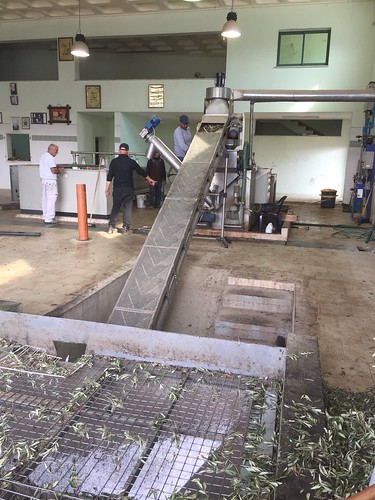
The conveyer's belt, feeding olives into the machines which will first wash them, then dry them, then press them and finally separate the oil from the water and pulp...
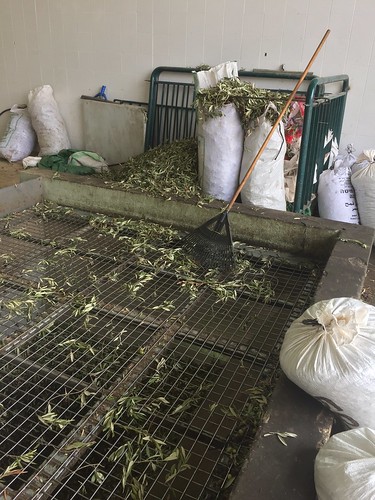
Last sorting before feeding into the machine.
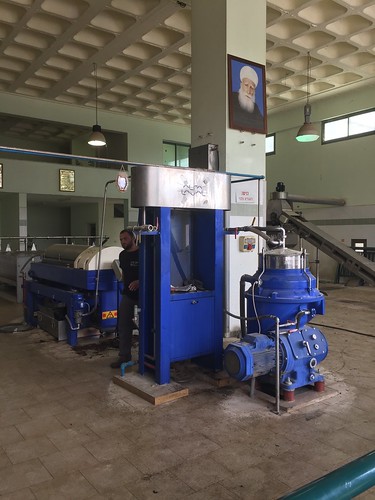
Mysterious machinery which I do not know its role but am guessing is the centrifuge.
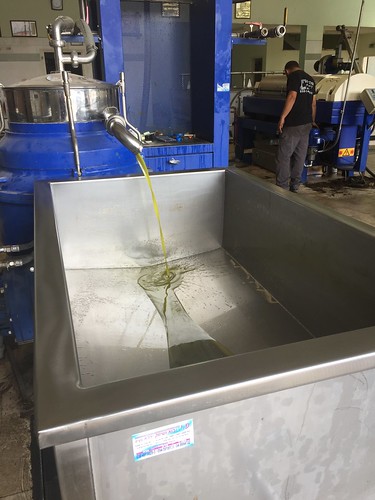
Olive oil coming out at the end of the process - practically liquid gold!
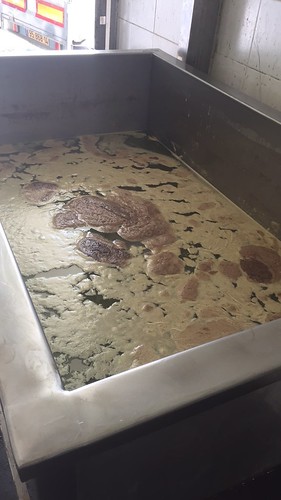
A super-frothy bath of freshly pressed olive oil. What's floating at the top is actually going to turn into sediment, eventually. Particles from the fruit's pulp, which has intensely bitter taste at first. The olive oil needs to settle for about a month before the taste improves.
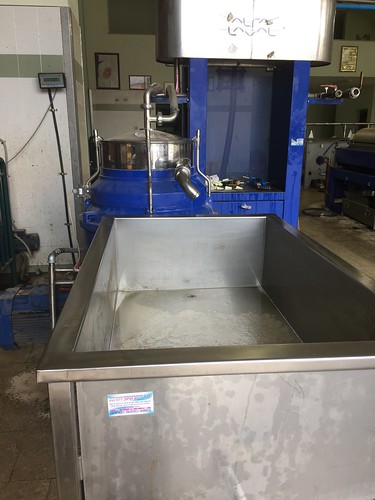
In the end, those 133 kilos yielded 32 kilo oil, which is about 24% yield. This amounted to just 2 more jugs of olives for our family. In total, we harvested and pressed 8 jugs of oils (144 kg). Not quite enough for the annual olive oil consumption of 5 households (two of which are with many children), but still very respectable. I will still need to get my olive oil for my soaps from elsewhere, but I'm very happy and proud taking part in this harvest and experiencing the process from start to finish. It really does give one much better appreciation for the finished product - olive oil for food, or the soap that can be made from it.
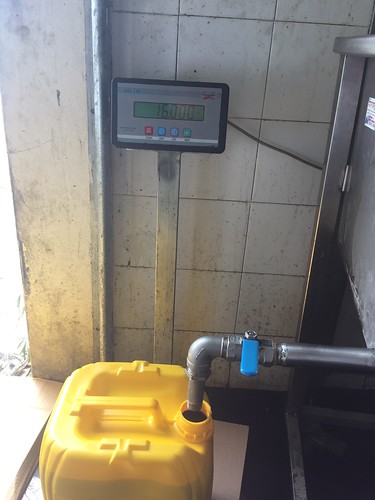
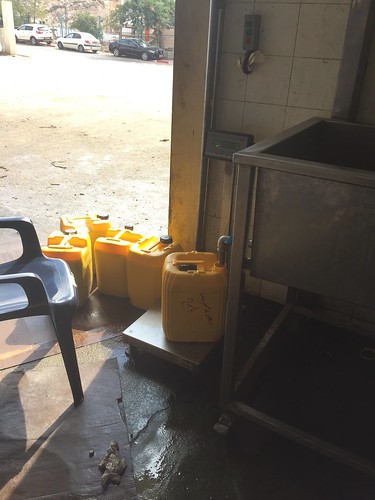
See you next year!
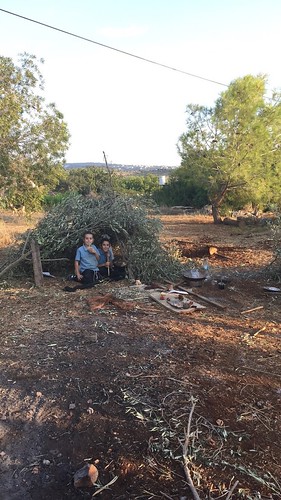
My nieces and nephews built an impromptu village with several huts from all the olive branches we pruned.



0 Comments:
Post a Comment
<< Home